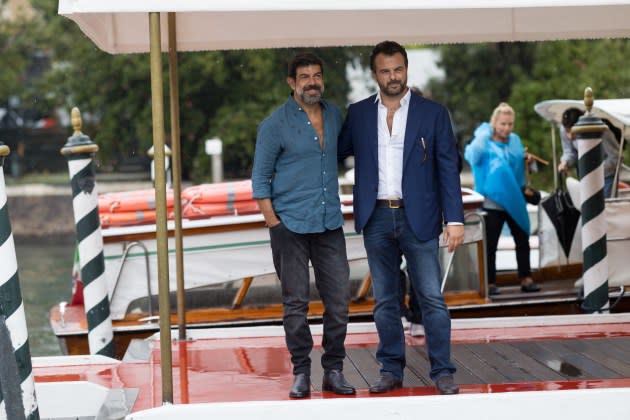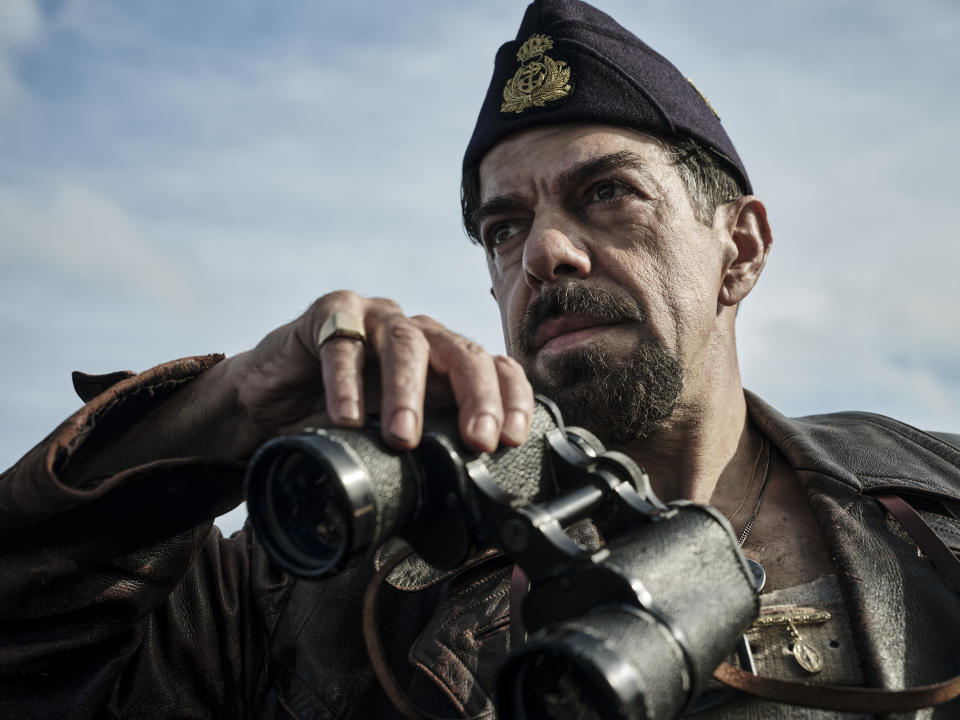‘Comandante’ Director Edoardo De Angelis On Finding Humanist Role Model In Italian Fascist Era Submarine Commander – Venice Opening Film Q&A
- Oops!Something went wrong.Please try again later.
- Oops!Something went wrong.Please try again later.

The Venice Film Festival kicks off its 80th edition on Wednesday with Italian director Edoardo De Angelis’s World War Two Italian submarine drama Comandante.
The Golden Lion contender was propelled into the prestigious opening slot in July when Luca Guadagnino’s Challengers was pulled, as it became clear that the film’s starry cast topped by Zendaya would not be able to attend due to the actors’ strike.
More from Deadline
Italian and Belgian talent will be leading the red carpet instead at the opening gala.
Multi-award-winning Italian actor Pierfrancesco Favino (Nostalgia, Padrenostro, The Traiter) leads the cast as real-life, Italian World War Two Submarine commander Salvatore Todaro.
As commander of the then brand new Italian submarine Cappellini, he led missions in the Atlantic alongside German U-boats sinking merchant sea vessels carrying supplies for the Allies.
He earned himself a place in history, however, after he defied orders and rescued 26 Belgian merchant seamen rather than leave them to perish after sinking their ship in October 1940.
De Angelis came across Todaro’s story through a 2018 speech by Italian Admiral Giovanni Pettorino.
He cited Todaro as example of how Italy’s contemporary coast guard should act when dealing with migrants trying to cross the Mediterranean, at a time of fierce debate in Italy of how to deal with illegal immigration, which has only intensified since.
The film recounts the nerve-wracking operation as Todaro took the Belgian seamen on board his vessel and sailed on the surface for three days, before disembarking them on the neutral island of Santa Maria in the Azores.
Todaro was reprimanded for this act of humanity by notorious German Navy chief Karl Dönitz, who reportedly referred to him as a “Don Quixote of the seas”.
Dönitz was later sentenced to a ten-year jail sentence at Nuremberg for “crimes against the laws of war”, while Todaro – who died at the age of 34 in 1942 off Tunisia – has posthumously been held up as a beacon of humanity.
Comandante is produced by Indigo Film and O’Groove with Rai Cinema, Tramp Ltd, VGroove and Wise Pictures in association with Beside Productions and collaboration with Paramount+.
Rai’s 01 Distribution is the theatrical distributor in Italy, where the release date has yet to be set, and True Colours handles international sales.

De Angelis talked to Deadline on the eve on the premiere about the film.
DEADLINE: What was it about Salvatore Todaro that drew you to him as a subject for a film?
EDOARDO DE ANGELIS: I wanted to make a film about strength. I was irritated by the way in which strength is often portrayed in relation to oppression and violence. Todaro represents another idea of strength, of an individual holding out their hand to the defenseless.
There was also another theme related to the questions I’ve asking myself about what it means to be Italian.
We’re a nation made up of people of all different origins, but in recent years, an idea has emerged that being Italian is somehow a privilege and an identity that is not open to others. I don’t agree with this. A nation born as a melting pot should be welcoming to others.
When Todaro says to the Belgian commander, “We’re all Italians.” He’s not saying everyone is Italian, he is saying we’re all human beings. It doesn’t mean, “I belong to a nation, which makes me different from you” but rather, “I belong to the only possible nation, the planet”.
DEADLINE: Regardless of Todaro’s personal humanity, it is still a brave move to make a heroic film about a figure who was acting under the orders of Fascist dictator Benito Mussolini…
DE ANGELIS: Italy was living under a dictator at a time. Individuals didn’t have the freedom to go up against that dictatorship.
There’s also the fact that the Italian Navy, which swore allegiance to the king and not Il Duce, was rather anarchic as a force. It had its own rules at sea. Todaro says at a certain point in the film, “Once on land, they can question my decision and remove me from the command, but here, right now, at sea, I decide and will take responsibility for my decisions.”
It’s extremely interesting that Todaro acted as he did under a regime with an ideology that has also vaguely inspired my current government, but which also awarded Todaro for valour.
I ask myself how a government inspired by the same ideas has forgotten a hero like Todaro, who never forgot the rules of the sea, even though it was war, and he was living under a dictatorship, a fascist dictatorship. That’s the short circuit I want to generate.
DEADLINE: It’s still rare to have a World War Two film told from this point of view…
DE ANGELIS: To be honest, I’ve never been interested in war films, or submarine films. I fell in love with with this story for its universality, which goes beyond its context of war and submarines. It’s a theme which touches humanity because we’re talking about strength and hospitality.
This film is not about belonging to one party or another, it is a question of belonging to the human race, whose relationships are regulated by eternal laws. At sea, there is only one law, that the defenseless must be saved, whatever regime we operate in. The time is ripe for us human beings, to strip ourselves of our ideologies and remember that regardless of political beliefs, there are certain human laws that should not be questioned by anyone.
DEADLINE: You and your co-writer Sandro Veronesi have also written a book of the same name about Todaro and his actions. What was the thinking behind this?
DE ANGELIS: On the fifth draft of the script, we realized that we had gathered a lot of material that wouldn’t find its place in the film. We decided to write the novel at that point as a way of going into more depth and to give a voice to all the people on submarine that we could not do justice to in the film.
DEADLINE: Can you talk a bit about the set design (led by set designer Carmine Guarino) and the shooting locations?
DE ANGELIS: For the exteriors, we recreated the submarines with the same dimensions, using the original plans which are in the care of [shipbuilder] Fincantieri. It measured 73-metres in length and seven metres in width and we used 70 tons of steel. It was a bit like a boat, you could stay on the deck, go in the turret or down into the sentry boxes. It was built at Cinecittà and then transported to Taranto [which is home to Italy’s submarine fleet). It was important for me to shoot there. We got a lot of support from the submarine corp. They were always by my side as consultants, helping me at every step, giving me advice. For every operation, on and off the vessel, there are military protocols to be respected and I wanted to get that right. We also shot in a tank outside Brussels… For the interiors, we built sets at Cinecittà
DEADLINE: How did you get Favino on board?
DE ANGELIS: We share the same agent who connected us. We’re both a bit shy so it took a bit of time to build a connection but in the end, we developed a strong relationship. We share the same deep work ethic.
Aside from being an amazingly talented actor, he’s an extremely generous human being who goes above and beyond what is asked of him for a role.
The shooting conditions were sometimes difficult. We were shooting in open water with special effect waves throwing thousands of litres of water at the cast. It was December and nighttime. Some of the cast didn’t manage to finish the shoots. Pierfrancesco stayed the course, giving an example, like a real commander.
DEADLINE: What are your hopes for this film which comes out at a time when the humanist values exhibited by Todaro are under pressure around the world?
DE ANGELIS: For me, making a film is always a political act. I hope the theme of the film will prompt reflection on the need to show solidarity with other human beings and deepen discussions on this theme. My other hope, how can I put this, is that it will show those on the right of politics, that you don’t have to be left-wing to be human.
Best of Deadline
Venice Film Festival @ 80: Memorable Moments & Stars 1932-2023 - Photo Gallery
Venice Film Festival 2023 Photos: Premieres, Red Carpets And Parties
Sign up for Deadline's Newsletter. For the latest news, follow us on Facebook, Twitter, and Instagram.

